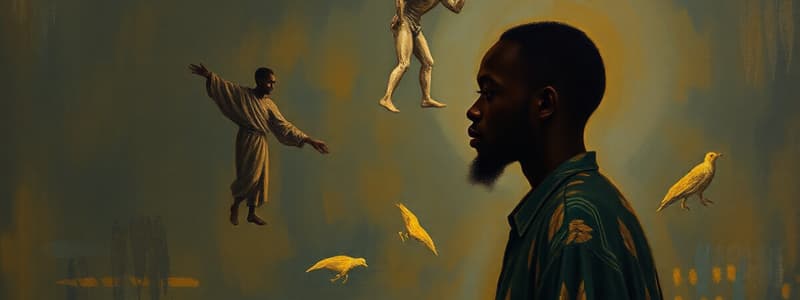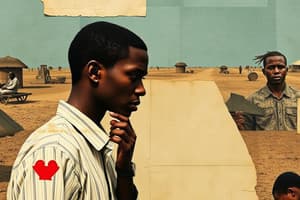Podcast
Questions and Answers
What was the author's main experience in life before arriving in the United States?
What was the author's main experience in life before arriving in the United States?
- Academic achievements
- Friendship and social activities
- Struggling for survival (correct)
- Traveling to different countries
What did the author's visa status require him to do within three months of arriving in the United States?
What did the author's visa status require him to do within three months of arriving in the United States?
- Find a job
- Apply for citizenship
- Return to Sierra Leone
- Enroll in school (correct)
Which of the following best describes the author's feelings towards happiness and normality before coming to the U.S.?
Which of the following best describes the author's feelings towards happiness and normality before coming to the U.S.?
- He was indifferent and uninterested.
- He felt nostalgic and sad.
- He felt hopeful and excited.
- He was distrustful and skeptical. (correct)
What was one major hurdle the author faced when trying to enroll in school?
What was one major hurdle the author faced when trying to enroll in school?
How did the author describe their past experience since the age of eleven?
How did the author describe their past experience since the age of eleven?
What action did the author's mother take to help him with school enrollment?
What action did the author's mother take to help him with school enrollment?
What does the term 'sufficient' mean in this context?
What does the term 'sufficient' mean in this context?
What is indicated about the author's view on life in New York?
What is indicated about the author's view on life in New York?
How did the narrator feel about the advice given by his friends?
How did the narrator feel about the advice given by his friends?
What observation did the narrator make about his friends' attitudes towards violence?
What observation did the narrator make about his friends' attitudes towards violence?
What does the term 'rehabilitation' refer to in the context of the author’s experience?
What does the term 'rehabilitation' refer to in the context of the author’s experience?
What habits did the narrator develop from his experiences?
What habits did the narrator develop from his experiences?
What activity did the narrator partake in with his friends that made him feel like a child again?
What activity did the narrator partake in with his friends that made him feel like a child again?
What was one of the worries the narrator and his friends shared while hanging out?
What was one of the worries the narrator and his friends shared while hanging out?
What did the narrator wish to experience through his friends?
What did the narrator wish to experience through his friends?
What significant event occurred after about a year of friendship?
What significant event occurred after about a year of friendship?
What was the initial reaction of the narrator towards the face paint?
What was the initial reaction of the narrator towards the face paint?
What strategy did the narrator use while playing paintball?
What strategy did the narrator use while playing paintball?
Why did the narrator claim to be good at paintball?
Why did the narrator claim to be good at paintball?
How did the children perceive the narrator after the paintball game?
How did the children perceive the narrator after the paintball game?
What lesson did the narrator reflect on in relation to warfare?
What lesson did the narrator reflect on in relation to warfare?
What past experience did the narrator share to explain his skills?
What past experience did the narrator share to explain his skills?
What misconception did the children have about the narrator's paintball skills?
What misconception did the children have about the narrator's paintball skills?
What was the group's outcome after the day's activities?
What was the group's outcome after the day's activities?
What was the author's initial reaction to their friends teaming up against them?
What was the author's initial reaction to their friends teaming up against them?
Why did the author choose to sit out the game?
Why did the author choose to sit out the game?
How did the author's friends react after the weekend of paintball?
How did the author's friends react after the weekend of paintball?
What was the author's concern about sharing their background with friends during the game?
What was the author's concern about sharing their background with friends during the game?
What does the term 'watered-down version' imply in the context of the author's tactics?
What does the term 'watered-down version' imply in the context of the author's tactics?
What did the author want their friends to understand about their family situation?
What did the author want their friends to understand about their family situation?
What phrase reflects the author's view of their friends' perspective on war?
What phrase reflects the author's view of their friends' perspective on war?
What emotional state did the author attribute to their friends when they decided to sit out the game?
What emotional state did the author attribute to their friends when they decided to sit out the game?
What primarily influenced the way the speaker communicated in the school setting?
What primarily influenced the way the speaker communicated in the school setting?
How did the speaker perceive their social interactions during high school?
How did the speaker perceive their social interactions during high school?
What assumption did some classmates make about the speaker's English?
What assumption did some classmates make about the speaker's English?
What did the speaker attempt to do to reduce discomfort among peers?
What did the speaker attempt to do to reduce discomfort among peers?
What were the peers' views of their own toughness?
What were the peers' views of their own toughness?
Why did the speaker feel the need to control their behavior at school?
Why did the speaker feel the need to control their behavior at school?
What significant event happened to Ishmael Beah at the age of twelve?
What significant event happened to Ishmael Beah at the age of twelve?
What stereotype did the speaker find beneficial to portray?
What stereotype did the speaker find beneficial to portray?
What does 'sophistication' refer to in the context of the speaker's communication?
What does 'sophistication' refer to in the context of the speaker's communication?
What does Ishmael Beah think about the loss of his baggage when arriving in New York City?
What does Ishmael Beah think about the loss of his baggage when arriving in New York City?
What does the fortune cookie's message indicate to Ishmael Beah?
What does the fortune cookie's message indicate to Ishmael Beah?
How did Ishmael Beah's new adoptive mother react when they met?
How did Ishmael Beah's new adoptive mother react when they met?
What major theme is highlighted in Ishmael Beah's narrative?
What major theme is highlighted in Ishmael Beah's narrative?
At what age did Ishmael Beah immigrate to New York City?
At what age did Ishmael Beah immigrate to New York City?
What realization did Ishmael Beah have upon recalling his past in Sierra Leone?
What realization did Ishmael Beah have upon recalling his past in Sierra Leone?
Which event directly preceded Ishmael Beah arriving in New York City?
Which event directly preceded Ishmael Beah arriving in New York City?
Flashcards
Connotation
Connotation
A word or phrase that suggests a particular feeling or idea, beyond its literal meaning.
Sophistication
Sophistication
The quality of being advanced or refined.
Stereotype
Stereotype
A belief that all members of a group share common traits, often negative or inaccurate.
Rehabilitation
Rehabilitation
Signup and view all the flashcards
Omen
Omen
Signup and view all the flashcards
Struggle
Struggle
Signup and view all the flashcards
Normality
Normality
Signup and view all the flashcards
Prospective-student Visa
Prospective-student Visa
Signup and view all the flashcards
Report Card
Report Card
Signup and view all the flashcards
Interject
Interject
Signup and view all the flashcards
War-Torn
War-Torn
Signup and view all the flashcards
Ishmael Beah's Arrival in New York
Ishmael Beah's Arrival in New York
Signup and view all the flashcards
Contrast Between Past and Present
Contrast Between Past and Present
Signup and view all the flashcards
Lost Luggage Symbolism
Lost Luggage Symbolism
Signup and view all the flashcards
Ishmael's Reaction to Lost Luggage
Ishmael's Reaction to Lost Luggage
Signup and view all the flashcards
Ishmael's Experiences in Sierra Leone
Ishmael's Experiences in Sierra Leone
Signup and view all the flashcards
Ishmael's Hope for the Future
Ishmael's Hope for the Future
Signup and view all the flashcards
Ishmael's Journey to New York
Ishmael's Journey to New York
Signup and view all the flashcards
Author's Point of View
Author's Point of View
Signup and view all the flashcards
Violence and Experience
Violence and Experience
Signup and view all the flashcards
Glorifying Violence
Glorifying Violence
Signup and view all the flashcards
Safety Habits
Safety Habits
Signup and view all the flashcards
Childhood Memories
Childhood Memories
Signup and view all the flashcards
Reliving Childhood
Reliving Childhood
Signup and view all the flashcards
Rollerblading Adventures
Rollerblading Adventures
Signup and view all the flashcards
Trip to upstate New York
Trip to upstate New York
Signup and view all the flashcards
Importance of Experience
Importance of Experience
Signup and view all the flashcards
Terrain
Terrain
Signup and view all the flashcards
Paces
Paces
Signup and view all the flashcards
Acting like a 'man'?
Acting like a 'man'?
Signup and view all the flashcards
Deliberate
Deliberate
Signup and view all the flashcards
First rule of warfare
First rule of warfare
Signup and view all the flashcards
Blend into the forest
Blend into the forest
Signup and view all the flashcards
Adapt to your environment
Adapt to your environment
Signup and view all the flashcards
Badass at paintball
Badass at paintball
Signup and view all the flashcards
Guerrilla Tactics
Guerrilla Tactics
Signup and view all the flashcards
Watered-down version
Watered-down version
Signup and view all the flashcards
Sense of Relief
Sense of Relief
Signup and view all the flashcards
Childlike Behavior
Childlike Behavior
Signup and view all the flashcards
Naive Innocence
Naive Innocence
Signup and view all the flashcards
Fear
Fear
Signup and view all the flashcards
Participate
Participate
Signup and view all the flashcards
Absence
Absence
Signup and view all the flashcards
Study Notes
Unusual Normality - Ishmael Beah
- Ishmael Beah, a New York Times best-selling author, was born in Sierra Leone.
- In 1998, at age 17, he arrived in New York City with just a passport.
- His checked baggage from Ivory Coast did not arrive.
- This contained two pairs of pants, two shirts, and other personal possessions.
- He met his adoptive mother at the airport, and they laughed about the lost baggage.
- They then went to Kmart, and later ate Chinese food.
- He considered this a "fresh new start."
- At age eleven, war broke out in Sierra Leone, and at twelve, he became an orphan.
- At thirteen, he joined the war as a soldier.
- At age sixteen, he was removed from the war and underwent rehabilitation.
- He came to the US to live with his mother.
- He faced issues when trying to enroll in schools in New York City.
- He was denied entry to some schools because he did not have report cards.
- The schools deemed unusual his lack of academic records during the war.
- He wrote an essay titled "Why I Do Not Have a Report Card."
- His essay, along with other assessments, allowed him entry to a UN school.
- He adjusted to New York's high school culture, but his experiences stood out.
- His classmates expressed surprise at his demeanor and behavior.
- He often avoided speaking with them about his military past, though he did participate in some recreational activities.
- He learned to "fit in" with a group of peers, playing sports, and participating in the youth activities.
- He gained a newfound understanding that the concept of violence was different from his experiences.
- His new friends had never experienced the real war, viewing violence as a thing to "glorify."
- His friends' perceptions of war were different from his.
- The story highlights the author's struggles to adapt to a new life in a new country.
Studying That Suits You
Use AI to generate personalized quizzes and flashcards to suit your learning preferences.




